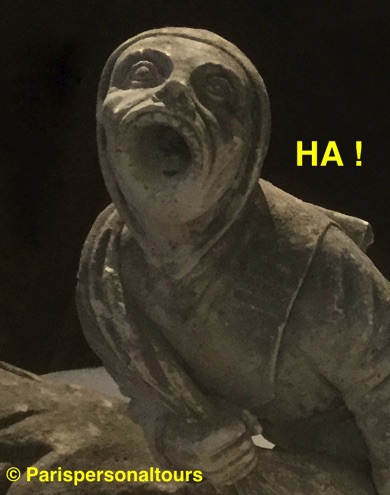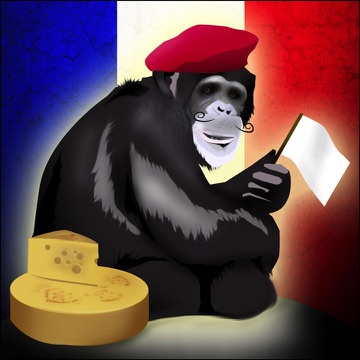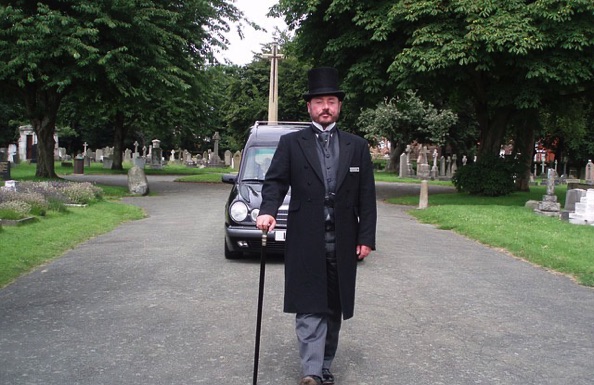
Let it first be said that, even though I am French, I am not of the surrendering kind.
Even though it didn't make me mad, I didn't really like this «cheese-eating surrender monkey» thing which took place some years back implying that the French are cowards who surrender quickly… It just bothered me because it is not true and, since I was a little boy, I have always hated injustice.
The French have many faults but being a coward is not particularly one of them. On the contrary, they have a history of being very brave but the problem is that they are so proud about their past that they think that what was true yesterday is still true today... they live on their aura, they feed (and keep feeding others) with a less-and-less-convincing self-image of their glorious past... and don't you dare tell them (or me!) that they are not the best people in the world!
The main problem for the French is that they have an oversized ego (and boy can I relate to that...) and that sometimes blinds them and prevents them from seeing their own flaws so that in the end they tend to take tourists for granted.
Now, about WWII: okay, Pétain surrendered on the 17th of June 1940 (while Charles De Gaulle was flying to England on the same day) and Pétain, as the President of the North occupied zone of France, later agreed to shake hands with Hitler… But that man, as most people see it nowadays, was a traitor to his country (even though there are still nowadays some people who believe he was a hero at the same time as there are still a lot of people all over the world who pathetically believe Hitler was a hero and a role model too), but does that make all the French people traitors and/or cowards? And what about the ones who made the choice to remain in the occupied zone of France? Those who had families to support, those who had nothing to lose (but their honor and their freedom), those who decided to join the Resistance or go to the South of France, or go to England, those who stayed because they had children or sick ones to take care of... or those who knew that the town was encircled and that they would never make it away alive on their own, so they stayed with the hope that one day they would be relieved from the invader’s claw…
And why did we surrender in the first place? Because, at the time, we had no other choice! You see, there is something very important for you to know: in 1870, Napoleon III, on a whim, declared war on Prussia. Big mistake: they were stronger than us and he was beaten almost overnight. He surrendered on September 4th 1870 and he then escaped to England where he ended the last two years of his life, where he is still buried, and we are not exactly asking to have his coffin brought back to France...


But did you know that, after Napoleon III surrendered, the city of Paris refused to surrender to the Prussians (Prussia being at the time a state which included Germany and Austria)? So they closed the walls of the city, they put cannons all around and they prepared to be under siege. They were under siege for one year... After they ate all the food they had stored, after they ate all the cats, dogs, pigeons, rats, horses, after they ate all the animals in the zoo (at Christmas 1870 camel and kangaroo reached sky-high prices on the menu of a deluxe restaurant), well, they had no other choice but to surrender, and that was indeed very humiliating… and they even had to give up two regions at the North-East border of the country: the Alsace and the Lorraine. The French then put on a low profile (which they got rid of since) and built the Sacré-Coeur to "expiate" from their sins. But they were fulminating inside and this outrage soon called for revenge...
When WWI started, the French went massively to war, with a big smile on their faces, because they thought that they would win easily and that the battle would soon be over. It happened to be the bloodiest war ever which lasted for four long years and during which millions of people died on the battlefront just trying to gain a few feet forward in the direction of the enemy. Just the thought of it makes me sick.
Pétain was a glorious General of that war (even though most of his "glory" from what I know, which is very little, came from giving orders to people to go and get killed without any hope of success) and later, during WWII, when all the potential leaders of France had died or fled to the South of France or fled to England (waiting for better days for the battle), he was there to accept the presidency of our country in exchange for compromising with the enemy. This was (and still is) something mostly seen as something which was not acceptable and which is still not accepted by us today.
Anyway, there was nothing else to do at the time than surrender because we knew from experience that Paris was undefendable and we just had to wait for better days for fighting back. What was terribly wrong and horribly shameful was that some members of the Vichy government did not only comply with some of the Nazi’s demands but were themselves sometimes quite "enthusiastic" and took initiative in the deportation of the Jewish population. This is a known fact for the French and I am proud that some of our leaders (even though it was done much later by people who were not involved at the time) acknowledged the fact and made the state’s repentance official (FYI it's a fact that I mention during my tour of the Jewish district).

Now, to get back to this «cheese-eating surrender monkey» thing, we learn in Wikipedia that the term was first coined in 1995 in an episode of "The Simpsons". But it was dug up and really became a journalistic cliché only in 2003 when some anti-French sentiment rose in the US because we simply didn’t endorse America’s war declaration to Irak and we dared say that the presence of Weapons of Mass Destruction still had to be proved.
At the time, the Francophobia which resulted in the US broke both my American father’s and my heart… But we also both knew that:
1) not all Americans thought like this.
2) there’s nothing that time won’t heal in the end (and it did).
And it so happens that love-and-hate relationships are the most passionate and the best worth-living-for, because love needs frustration to feed itself so that it can disappear, be reborn, reinvent itself and (hopefully) never extinguish…
And that’s why we have such strong ties with Americans! And the British!
Because we’re all a big family you know. We’re all related one way or the other.
And those family-ties, they can sometimes be an ordeal... but they can also be a real treat.
The way I see it: take the « French-English-American triangle » (the FEAT?) for example, take any pair out of the three and, in the end, all it comes down to is that they can’t live with each other but they also can’t live without each other!
And, to end (momentarily) this digression, I just wanted to specify that, ironically (and do I love irony), it is stated in the French version of « cheese-eating surrender monkey » page in Wikipedia (but « strangely » not in the English version of it) that, in the end, it was proved that the supposed evidence of existing Weapons of Mass Destructions was forged... and the French were proven right!
